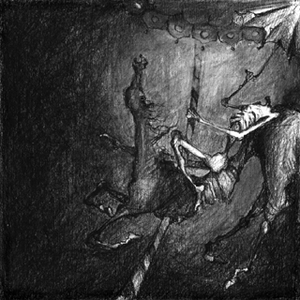Their first work, Die Kemenaten scharlachroter Lichter (1997) was accepted positively by critics. The band's next work was the "Russian trilogy" consisting of the albums Das Tagebuch der Hanna Anikin, Das Schachbrett Des Trommelbuben Zacharias and 39 Jahre für den Leierkastenmann. "39 Jahre für den Leierkastenmann" (subtitled "Ein Stück für die Judenstadt") is a play of three acts that narrates the misfortunes of four Russian and Jewish musicians during World War II. In 2004 they released Ein Toter Fährt Gern Ringelspiel (limited edition). The band released "Kokon. Ein schaurig-schönes Schachtelstück" in 2011, and released their last album to date, "Des Winters finsterer Gesell" in March 2013.
Band's discography:
* Kissarna (demo), 1994
* Mysterious Realms / Heidebilder (split with Amestigon), 1996
* Die Kemenaten Scharlachroter Lichter, 1997
* Das Tagebuch der Hanna Anikin, 1997
* Das Schachbrett Des Trommelbuben Zacharias, 1998
* 39 Jahre Für Den Leierkastenmann, 2001
* Ein Toter Fährt Gern Ringelspiel, 2004
* kokon. Ein schaurig-schönes Schachtelstück, 2011
* Des Winters finsterer Gesell, 2013
Band's websites:
* http://www.angizia.com/
* http://www.facebook.com/angiziaofficial
* http://www.myspace.com/angiziaofficial
Liebt Dich Range die Dohle?
Angizia Lyrics
Jump to: Overall Meaning ↴ Line by Line Meaning ↴
Die Dohle reiàŸt dem Kind das Laken vom Leib und beginnt den Leichnam auszusaugen. Wie besessen zerrt der Vogel am kalten Fleisch der Toten, zuerst an den à"rmeln, dann an den FüàŸen, später am Unterleib, zuletzt im Gesicht. Der Werkelmann klettert aus der Grube und blickt von oben auf den bald völlig entstellten Leichnam.
DIE BUCKLIGE
Es hockt dieser Vogel, sich auf deine Leich'
Es ist dieser Vogel, wie er trottet und schleicht,
DER WERKELMANN
Ein Ekel, das dich nun beraubt?
Ein Lump, ein Scheusal, ein Feind?
DIE BUCKLIGE
Liebt dich Range die Dohle?
Stiehlt sie dich scheel in die Nacht?
Es raubt dieser Vogel dein prachtvolles Haar.
Er saugt wie besessen dein Blut unsagbar.
Er stiehlt, was ich liebe und höhnt mit Begehr'.
Er nimmt deine Anmut, er quält dich so sehr.
DER WERKELMANN
Liebt dich Range die Dohle?
Liebt es dich mehr, dieses Tier?
Liebt es dich mehr, dieses Tier?
(Violine)
DIE BUCKLIGE
Der Tod ist gefräàŸig. Er winselt und schreit:
Er zerrt an den Leichen und meiàŸelt sie gleich.
DER WERKELMANN
Liebt dich Range die Dohle?
Liebt es dich mehr, dieses Tier?
The lyrics to Angizia's song Liebt Dich Range die Dohle? depict a disturbing scene where a crow is devouring the corpse of a child. The lyrics describe how the crow is obsessively tugging at the flesh of the dead child, starting with the sleeves, then the feet, the groin, and finally the face. The singer, a "buckled" woman, observes the scene and questions if the crow, named "Range," loves the dead child. She contemplates the stealing of the child's beauty and the vampiric nature of the bird. The song builds to a climax, where the singer questions whether the crow loves the child more than any person ever could.
The lyrics are unique in their imagery, creating a dark and gruesome portrait of death and decay. The crow, depicted as a greedy and morbid monster, seems to represent the harsh finality of death, while the singer symbolizes a powerless observer trying to make sense of the chaos. The song uses subtle poetic devices, such as alliteration and repetition, to convey the haunting feeling of the scene. By asking whether the crow loves the dead child more than any person could, the song implies that human love is limited, and that perhaps the love one feels after death is more powerful.
Line by Line Meaning
Es hockt dieser Vogel, sich auf deine Leich'
This bird is perched on your corpse
Es ist dieser Vogel, wie er trottet und schleicht,
It's the way the bird trots and sneaks
Ein Ekel, das dich nun beraubt?
Disgusting, that it now robs you?
Ein Lump, ein Scheusal, ein Feind?
A scoundrel, a monster, an enemy?
Liebt dich Range die Dohle?
Does the jackdaw Range love you?
Stiehlt sie dich scheel in die Nacht?
Does it steal you sneakily into the night?
Es raubt dieser Vogel dein prachtvolles Haar.
This bird steals your magnificent hair.
Er saugt wie besessen dein Blut unsagbar.
It sucks your blood relentlessly and unspeakably.
Er stiehlt, was ich liebe und höhnt mit Begehr'.
It steals what I love and mocks with desire.
Er nimmt deine Anmut, er quält dich so sehr.
It takes away your grace, it tortures you so much.
Liebt dich Range die Dohle?
Does the jackdaw Range love you?
Liebt es dich mehr, dieses Tier?
Does this animal love you more?
(Violine)
Violin
Der Tod ist gefrässig. Er winselt und schreit:
Death is voracious. It whimpers and screams:
Er zerrt an den Leichen und meißelt sie gleich.
It pulls at the corpses and carves them equally.
Liebt dich Range die Dohle?
Does the jackdaw Range love you?
Liebt es dich mehr, dieses Tier?
Does this animal love you more?
Contributed by Tyler O. Suggest a correction in the comments below.

Chris Colin
amo estas canciones..desde el primer dia q escuche angizia,,emm hace unos dos años.son hermosas y facinantes